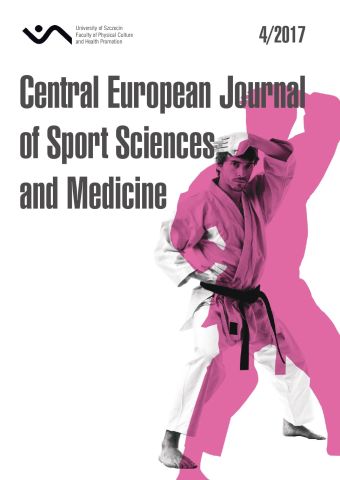
ISSN: 2300-9705
eISSN: 2353-2807
OAI
DOI: 10.18276/cej.2017.4-05




Issue archive /
Vol. 20, No. 4/2017
Design, Validation, and Reliability of Survey to Measure Knowledge of Nutrition, Weight Control and its Risks
| Authors: |
Andrea
Visiedo
Department of Physical Activity and Sport. University of Murcia, Spain Jillian E. Frideres FoodWise. University of Wisconsin - Extension, United States José M. Palao Department of Health, Exercise Science and Sport Management. University of Wisconsin - Parkside, United States |
| Keywords: | sport health prevention evaluation |
| Data publikacji całości: | 2017 |
| Page range: | 13 (39-51) |
Abstract
The purpose of this study was to design, validate, and test the reliability of an instrument to evaluate knowledge of nutrition, weight control and its risk. The instrument collects information regarding: socio-demographics and athletic status; basic knowledge of nutrition (the diet they follow, nutrients, supplements, energy balance, myths, hydration and habits); and weight control and risks (weight control, eating behaviors, and weight control habits). The design, validation, and testing of the reliability of the questionnaire were done in four phases: a) design and development of the instrument, b) content validation, c) instrument reliability, and d) concurrent validity. The results show that the instrument is suitable for measuring nutrition, weight control and risk knowledge in athletes. The instrument that was developed and validated in this paper can contribute to assessing how the athletes evolve through their different formation stages.
Download file
Article file
Bibliography
| 1. | Artioli, G.G., Gualano, B., Franchini, E., Scagliusi, F.B., Takesian, M., Fuchs, M., Lancha, A.H., Jr. (2010a) Prevalence, magnitude, and methods of rapid weight loss among judo competitors. Medicine and Science in Sports and Exercise, 42, 436–442. |
| 2. | Artioli, G.G., Scagliusi, F., Kashiwagura, D., Franchini, E., Gualano, B., Junior, A.L. (2010b) Development, validity and reliability of a questionnaire designed to evaluate rapid weight loss patterns in judo players. Scandinavian Journal of Medicine Science in Sports, 20. |
| 3. | Beals, K.A., Brey, R.A., Gonyou, J.B. (1999). Understanding the female athlete triad: Eating disorders, amenorrhea, and osteoporosis. The Journal of School Health, 8 (69), 337–340. |
| 4. | Bean´s, A. (2010). Sports nutrition for young athletes. London: A C Black Publishers Ltd. |
| 5. | Bonci, C.M., Bonci, L.J., Granger, L.R., Johnson, C.L., Malina, R.M., Milne, L.W., Ryan, R.R. Vanderbunt, E.M. (2008). National athletic trainers’ association position statement: Preventing, detecting, and managing disordered eating in athletes. Journal of Athletic Training, 43, 80–108. |
| 6. | Bonci, L. (2009). Sport nutrition for coaches. United States of America. Human kinetics. |
| 7. | Brito, C.J., Castro, A.F., Souza, I.S., Bouzas, J. C., Cordova, C. Franchini, E. (2012). Methods of body-mass reduction by combat sport athletes. International Journal of Sport Nutrition and Exercise Metabolism, 22, 89–97. |
| 8. | Bulger, S.M., Housner, L.D. (2007). Modified Delphi investigation of exercise science in physical education teacher education. Journal of Teaching in Physical Education, 26, 57–80. |
| 9. | Escurra, L. (1989). Cuantificación de la validez de contenido por criterio de jueces [Quantification of content validity through judge criteria]. Revista de Psicología, 6, 103–111. |
| 10. | Hague, P., Hague, N., Morgan, C. (2004). Market research in practice: A guide to the basics. London: Kogan Page. |
| 11. | Hobart, J.A. (2000). The female athlete triad. American Family Physician, 11 (61), 3357–3364. |
| 12. | Joy, E., Clark, N., Ireland, M.L., Martire, J., Nattiv, A., Varechok, S. (1997). Team management of the female athlete triad: Part 1: What to look for, what to ask. The Physician and Sportsmedicine, 3 (25), 94–102. |
| 13. | Juzwiak, C.R. Ancona-Lopez, F. (2004). Evaluation of nutrition knowledge and dietary recommendations by coaches of adolescent Brazilian athletes. International Journal of Sport Nutrition and Exercise Metabolism, 14, 222–235. |
| 14. | Landis, J.R., Koch, G.G. (1977). The measurement of observer agreement for categorical data. Biometrics, 1 (33), 159–174. DOI: 10.2307/2529310. |
| 15. | Padilla, J.L., Gómez, J., Hidalgo, M.D., Muñiz, J. (2007). Esquema conceptual y procedimientos para analizar la validez de las consecuencias del uso de los test [Conceptual diagram and procedures to analyze the validity of the consecuences of test use]. Psicothema, 19, 173–178. |
| 16. | Penfield, R.D., Giacobbi, P.R. (2004). Applying a score confidence interval to Aiken’s item content-relevance index. Measurement in Physical Education and Exercise Science, 4 (8), 213–225. |
| 17. | Rust, D.M. (2002). The female athlete triad: Disordered eating, amenorrhea, and osteoporosis. The Clearing House, 6 (75), 301–305. |
| 18. | Steen, S.N., Brownell, K.D. (1990). Patterns of weight-loss and regain in wrestlers – has the tradition changed. Medicine and Science in Sports and Exercise, 22, 762–768. |
| 19. | Sundgot-Borgen, J. (2002). Weight and eating disorders in elite athletes. Scandinavian Journal of Medicine Science in Sports, 12, 259–260. |
| 20. | Thomas, S.J. (2004). Using web and paper questionnaires for data-based decision making: From design to interpretation of the results. Thousand Oaks, CA: Corwin Press. |
| 21. | Trochim, W. Donnelly, J.P. (2007). The research methods knowledge base (3rd Edition). Mason, OH: Cengage Learning-Atomic Dog. |
| 22. | Ubeda, N., Gil-Antunano, N.P., Zenarruzabeitia, Z.M., Juan, B.G., Garcia, A. Iglesias-Gutierrez, E. (2010). Food habits and body composition of Spanish elite athletes in combat sports. Nutricion Hospitalaria, 25, 414–421. |
| 23. | Valliant, M.W., Emplaincourt, H.P., Wenzel, R.K. Garner, B.H. (2012). Nutrition education by a registered dietitian improves dietary intake and nutrition knowledge of a ncaa female volleyball team. Nutrients, 4, 506–516. |
| 24. | Zawila, L.G., Steib, C.S.M., Hoogenboom, B. (2003). The female collegiate cross-country runner: Nutritional knowledge and attitudes. Journal of Athletic Training, 38, 67. |
| 25. | Zhu, W., Ennis, C.D., Chen, A. (1998) Many-faceted Rasch modelling expert judgment in test development. Measurement in Physical Education and Exercise Science, 1 (2), 21–39. |